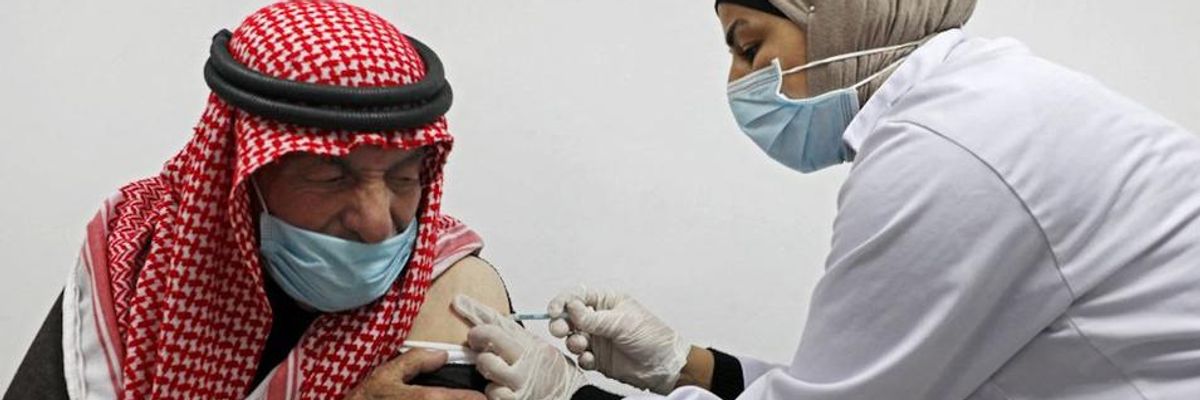As a third wave of Covid-19 cases continues to overwhelm a Palestinian healthcare infrastructure already strained by decades of Israeli occupation and ecomomic blockade, the international medical charity Medecins Sans Frontieres--also known as Doctors Without Borders--on Wednesday issued an urgent plea to authorities in both Israel and Palestine to "step up efforts to curb the spread of the disease, including through vaccination."
"In Israel the large availability of vaccine doses is now allowing the government to pursue herd immunity, without any intention to significantly contribute to the improvement of vaccination rates in the Palestinian territories."
--Ely Sok, MSF
Noting the surge in coronavirus hospitalizations and the fact that only around two percent of Palestinians have been vaccinated against the virus, MSF said in a statement that "both the Israeli government and the Palestinian authorities must immediately significantly increase efforts to slow the spread of Covid-19 and its new variants."
In the statement, MSF intensive care physician Dr. Juan Pablo Nahuel Sanchez said that "the number of positive cases is at its highest level since the beginning of the pandemic," and that hospitals are struggling to handle the influx of patients.
"There is not enough space, beds, or staff to help all of our critical patients, and people are dying," he warned.
"The percentage of younger people affected by Covid-19 has increased dramatically," said Nahuel Sanchez. "One in three patients currently admitted to Dura hospital is aged between 25 and 64, whereas before the majority of patients were over 64," he added, referring to a hospital in the illegally occupied West Bank where 71 patients are currently being treated for Covid-19.
According to the Palestinian Ministry of Health, around three quarters of new coronavirus cases are the B117 variant, which was first identified in the U.K. and is believed to be more contagious and deadlier than the original viral strain.
MSF and other healthcare advocates also expressed serious worries about delays in Palestinian vaccinations.
"We are very concerned about the delayed and slow vaccination roll out," said Ely Sok, MSF head of mission in the Palestine territories. "On the one hand, in Israel the large availability of vaccine doses is now allowing the government to pursue herd immunity, without any intention to significantly contribute to the improvement of vaccination rates in the Palestinian territories. On the other, it has proven difficult to obtain a clear picture of the availability and delivery strategy of the vaccine doses already received from the Palestinian health authorities."
"Meanwhile, frontline workers and high-risk groups in Palestine are nowhere near having protection from the disease," Sok added.
Israel has been admonished internationally for practicing what critics have called "vaccine apartheid" in Palestine. In the United States, Rep. Jamaal Bowman (D-N.Y.) has led calls in Congress for Israeli authorities to swiftly vaccinate Palestinians living under their military occupation and economic blockade.
"According to the Fourth Geneva Convention, which obligates an occupying power to provide 'adoption and application of the prophylactic and preventive measures necessary to combat the spread of contagious diseases and epidemics,' Israel... has a responsibility to provide vaccines to the Palestinian people," Bowman stressed last month. "It is therefore concerning that Israeli settlers in the occupied West Bank will be receiving the vaccine from the Israeli government, but the Palestinians in the West Bank will not."

